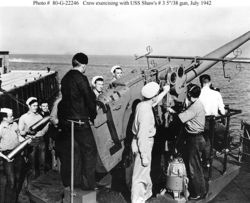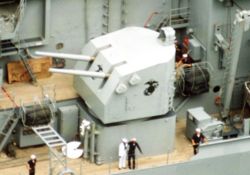5"-38 caliber gun: Difference between revisions
imported>Richard Jensen (let the military handle this weapon) |
mNo edit summary |
||
| (13 intermediate revisions by 6 users not shown) | |||
| Line 1: | Line 1: | ||
[[Image:5in-38OpenMount.jpg|thumb|250px|5"/38 caliber open mount gun aboard the [[USS Shaw (DD-373)]] in 1942. This is a MK12 unit or very similar.]] | {{PropDel}}<br><br>{{subpages}} | ||
The '''5"/38 caliber gun''' was mounted on a very large number of [[United States Navy|U.S. Navy]] ships in the [[World War II]] era. It continued to be used into the 1970's, but has disappeared from service today. The barrel of a 5"/38 [[caliber]] gun has a five inch (127 mm) bore and a length 38 times the bore diameter, or 190 inches (15.83 ft. or 4.826 m) long. | {{slashtitle|5"/38 caliber gun}} | ||
{{TOC|left}} | |||
[[Image:5in-38OpenMount.jpg|thumb|250px|5"/38 caliber open mount gun aboard the [[USS Shaw (DD-373)]] in 1942. This is a MK12 unit or very similar.]] | |||
The '''5"/38 caliber gun''' was mounted on a very large number of [[United States Navy|U.S. Navy]] ships in the [[World War II]] era. It was a [[dual-purpose gun]] (DP), effective for both [[anti-surface warfare|anti-surface]] and [[anti-air warfare]]. The gun continued to be used into the 1970's, but has disappeared from service today. The barrel of a 5"/38 [[caliber]] gun has a five inch (127 mm) bore and a length 38 times the bore diameter, or 190 inches (15.83 ft. or 4.826 m) long. | |||
== Performance == | == Performance == | ||
The 5"/38 could project a 55 pound (25 kg) projectile for ranges up to 18,200 yards (16.6 km). | The 5"/38 could project a 55 pound (25 kg) projectile for ranges up to 18,200 yards (16.6 km). In its antiaircraft role, it had a ceiling of 37,200 feet (11,300 m) at 85 degrees elevation.<ref>{{cite web |url= http://www.destroyers.org/Ord-Articles/5_inch_twin.htm |title= The 5 Inch |accessdate= 2006-10-06}}</ref> Millions of rounds of ammunition were produced for these guns, with over 720,000 rounds still remaining in Navy storage depots in the mid-1980s. The load consisted of a powder charge in a brass or low-alloy steel casing and a separate projectile. Many types of projectile were available, including AA Common, semi-armor piercing, [[proximity fuze|proximity fuze/variable time (VT)]] fragmenting and high explosive (HE), point- and base detonating HE, white phosphorus and illuminating star shell. | ||
== Gun mounts == | == Gun mounts == | ||
[[Image:5in-38DualMount.jpg|thumb|left|250px|[[USMC]] crewed 5"/38 caliber dual gun mount aboard the [[USS New Jersey (BB-62)]], 1984.]] | |||
There were several models of the 5"/38, differentiated by the word ''Mark'' (or its abbreviation ''MK'') and a number. The '''5"/38 MK 12''' was a single-barrel open unit widely used on amphibious ships, auxiliaries, and merchant ships. The '''5"/38 MK 30''' was a single-barrel enclosed unit widely used on [[destroyer]]s. The '''5"/38 MK 38''' was a dual enclosed unit specifically designed for newer destroyers. All of these models were also used on [[aircraft carrier]]s, [[battleship]]s, and other large combatants. | There were several models of the 5"/38, differentiated by the word ''Mark'' (or its abbreviation ''MK'') and a number. The '''5"/38 MK 12''' was a single-barrel open unit widely used on amphibious ships, auxiliaries, and merchant ships. The '''5"/38 MK 30''' was a single-barrel enclosed unit widely used on [[destroyer]]s. The '''5"/38 MK 38''' was a dual enclosed unit specifically designed for newer destroyers. All of these models were also used on [[aircraft carrier]]s, [[battleship]]s, and other large combatants. | ||
| Line 34: | Line 39: | ||
*[[Naval gunfire]] | *[[Naval gunfire]] | ||
[[Category:Reviewed Passed]][[Category:Suggestion Bot Tag]] | |||
[[Category: | |||
Latest revision as of 11:00, 4 July 2024
| This article may be deleted soon. | ||||||||||||||||||||||||||
|---|---|---|---|---|---|---|---|---|---|---|---|---|---|---|---|---|---|---|---|---|---|---|---|---|---|---|
Due to technical limitations, this article uses an unusual title. It should be called 5"/38 caliber gun.
 5"/38 caliber open mount gun aboard the USS Shaw (DD-373) in 1942. This is a MK12 unit or very similar. The 5"/38 caliber gun was mounted on a very large number of U.S. Navy ships in the World War II era. It was a dual-purpose gun (DP), effective for both anti-surface and anti-air warfare. The gun continued to be used into the 1970's, but has disappeared from service today. The barrel of a 5"/38 caliber gun has a five inch (127 mm) bore and a length 38 times the bore diameter, or 190 inches (15.83 ft. or 4.826 m) long. PerformanceThe 5"/38 could project a 55 pound (25 kg) projectile for ranges up to 18,200 yards (16.6 km). In its antiaircraft role, it had a ceiling of 37,200 feet (11,300 m) at 85 degrees elevation.[1] Millions of rounds of ammunition were produced for these guns, with over 720,000 rounds still remaining in Navy storage depots in the mid-1980s. The load consisted of a powder charge in a brass or low-alloy steel casing and a separate projectile. Many types of projectile were available, including AA Common, semi-armor piercing, proximity fuze/variable time (VT) fragmenting and high explosive (HE), point- and base detonating HE, white phosphorus and illuminating star shell. Gun mountsThere were several models of the 5"/38, differentiated by the word Mark (or its abbreviation MK) and a number. The 5"/38 MK 12 was a single-barrel open unit widely used on amphibious ships, auxiliaries, and merchant ships. The 5"/38 MK 30 was a single-barrel enclosed unit widely used on destroyers. The 5"/38 MK 38 was a dual enclosed unit specifically designed for newer destroyers. All of these models were also used on aircraft carriers, battleships, and other large combatants.
Gun crewsDepending on the mount, a 5"/38 caliber gun could have a crew of up to 14 personnel, nine in the gun mount and 5 in the handling room. In US service, most gun crews were US Navy personnel. Even the civilian Merchant Marine ships had a small detachment of the Navy Armed Guard on board to operate the 5"/38 and other guns. One exception to this was on ships with a Marine Detachment, where the Marines manned one of the mounts, usually decorated with the Marine emblem. Notes
See also |
||||||||||||||||||||||||||
